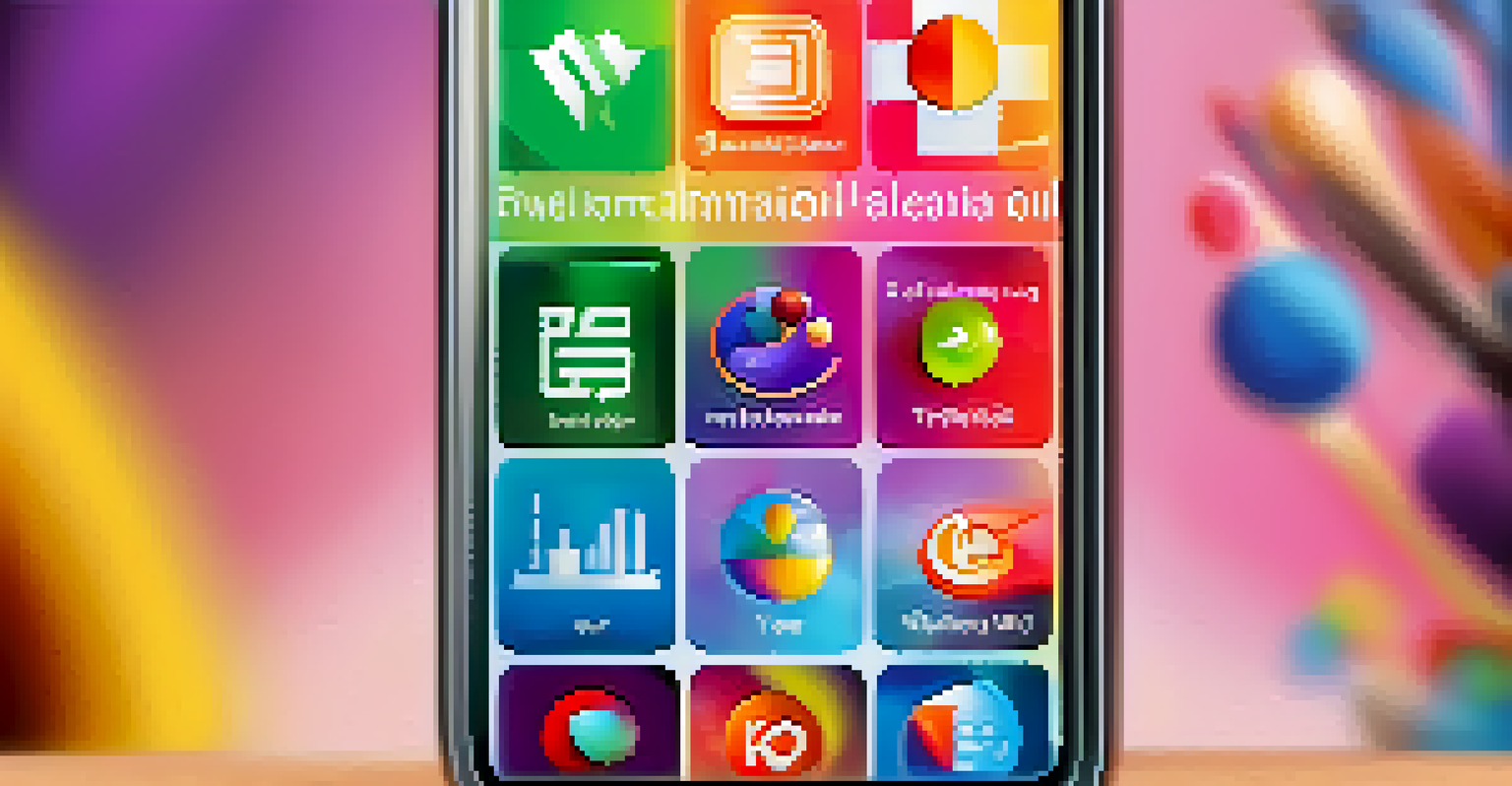The Influence of Mobile Learning on Study Habits

Understanding Mobile Learning and Its Rise
Mobile learning, or m-learning, refers to educational activities that utilize mobile devices like smartphones and tablets. This approach has gained immense popularity, especially with the rise of digital technology and the internet. As more students embrace mobile devices for learning, it’s essential to understand how this shift influences their study habits.
Mobile learning is not just a trend; it’s a revolution in education that allows students to learn anytime, anywhere.
The convenience of accessing educational resources on-the-go is a game changer. Imagine being able to review lecture notes or watch instructional videos while commuting or waiting in line. This flexibility allows students to integrate learning into their daily routines seamlessly, making study times more frequent and less daunting.
Moreover, the rise of mobile applications tailored for education has further fueled this trend. From language learning apps to interactive quizzes, these tools encourage students to engage with content in innovative ways, making learning more enjoyable and effective.
The Flexibility of Learning Anytime, Anywhere
One of the most significant benefits of mobile learning is the flexibility it offers. Students can learn at their own pace and revisit complex topics whenever they need to. This freedom to study anytime and anywhere can lead to improved retention of information, as learners are not bound by traditional classroom settings.

For instance, a student who struggles with a particular subject can easily find supplementary materials online or watch educational videos during their free time. This on-demand nature of learning empowers students to take control of their educational journey, making study habits more personalized and effective.
Flexibility in Learning Anytime
Mobile learning offers students the ability to study at their own pace and revisit topics anywhere, leading to improved retention and personalized learning experiences.
Additionally, this flexibility often reduces stress associated with rigid study schedules. Students can balance their academic responsibilities with personal commitments, leading to a healthier study-life balance and, ultimately, better academic performance.
Enhanced Engagement Through Interactive Learning Tools
Mobile learning often incorporates interactive elements that keep students engaged. Features like gamification, quizzes, and discussion forums transform traditional study methods into dynamic learning experiences. This increased engagement can lead to deeper understanding and retention of material.
The future of learning is mobile, and it’s transforming how we engage with knowledge.
Consider how a simple quiz app can turn studying for exams into a fun challenge. Students are more likely to retain information when they are actively involved in the learning process. This shift towards interactive learning tools is reshaping how study materials are consumed and understood.
Moreover, social features in mobile learning platforms allow students to connect with peers, fostering collaboration and discussion. This sense of community can motivate learners to stay committed to their studies, as they share knowledge and support each other.
The Role of Social Media in Study Habits
Social media platforms have become vital tools for mobile learning, allowing students to share resources and study tips. Platforms like Twitter, Facebook, and Instagram serve as informal learning spaces where students can engage with educational content and connect with experts in their fields.
For example, a student might join a Facebook group dedicated to a specific subject, gaining access to valuable resources such as study guides and past exam papers. These interactions can stimulate discussions that deepen understanding and enhance study habits.
Engagement Through Interactivity
Interactive tools like quizzes and gamification in mobile learning enhance student engagement, making the learning process more enjoyable and effective.
However, it’s essential to strike a balance between productive use of social media and potential distractions. While these platforms can enhance learning, they can also lead to procrastination if not managed properly, emphasizing the need for self-discipline in mobile learning contexts.
Personalization of Learning Experiences
Mobile learning allows for a high degree of personalization, catering to individual learning styles and preferences. Students can choose resources that resonate with them, whether it's podcasts, videos, or interactive apps, making their study time more effective.
For instance, a visual learner might prefer video tutorials, while an auditory learner may benefit from listening to podcasts. This customization means that students can develop study habits that align with their strengths, enhancing their overall learning experience.
Moreover, many mobile learning applications use algorithms to suggest content based on previous interactions, further tailoring the educational journey. This level of personalization not only boosts engagement but also encourages students to take ownership of their learning.
Challenges of Mobile Learning and Study Habits
Despite its many benefits, mobile learning presents several challenges that can negatively impact study habits. One significant issue is the potential for distractions, as mobile devices are often filled with notifications and apps that can pull attention away from studying.
Imagine trying to focus on an important topic while your phone buzzes with social media alerts or messages. This constant interruption can disrupt concentration and hinder the learning process, making it vital for students to develop strategies to minimize distractions.
Personalized Learning Journeys
Mobile learning allows for tailored educational experiences, enabling students to choose resources that match their individual learning styles and preferences.
Additionally, the reliance on technology can lead to issues like screen fatigue and decreased retention of information. Students must find a balance between utilizing mobile learning tools and taking breaks to ensure that their study habits remain effective and sustainable.
The Future of Mobile Learning in Education
As technology continues to evolve, so will the landscape of mobile learning. Innovations like augmented reality (AR) and virtual reality (VR) are beginning to make their way into educational settings, promising to enhance the learning experience even further.
These advancements could allow students to explore complex concepts in immersive environments, making studying more engaging and effective. For instance, a biology student might use AR to visualize the human body in 3D, deepening their understanding of anatomy.

Looking ahead, the integration of mobile learning into mainstream education seems inevitable. As educators and institutions recognize its benefits, they will continue to adapt teaching methods, shaping the future of study habits for generations to come.